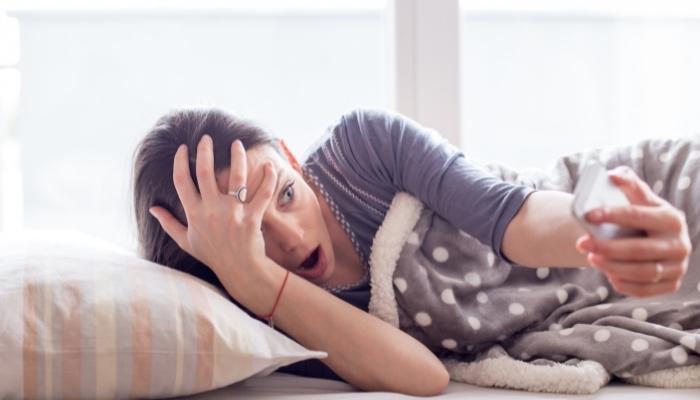Waking up in the morning should feel great — not like your head is about to explode. But sometimes, morning headaches can't be helped. As you transition into the waking-up stage of your sleep routine, your brain becomes more sensitive and more responsive to changes in body position, touch, and sound, which is how morning headaches come into being.
While these morning headaches can be caused by health disorders, personal habits are also a factor. We'll go through the types of headaches you can experience and some of the most common causes so you can prevent yourself from getting them in the future!
Disclaimer: The information on this site is not intended or implied to be a substitute for professional medical advice, diagnosis, or treatment. We encourage you to consult your physician if you are experiencing chronic headaches or other severe symptoms.
Types of Headaches

Headaches come in several types — in fact, there are over 150! Any of these types can be behind your morning headaches, but the most common culprits are migraine headaches, cluster headaches, tension headaches, hypnic headaches, and paroxysmal hemicrania.
- Migraine Headaches cause an intense throbbing sensation localized to one area and can cause sensitivity to light and sound. These headaches are often caused by dehydration, poor sleep, hormonal changes, stress, and certain foods and drinks.
- Cluster Headaches are more severe and occur in "clusters" or groups over extended periods. They usually affect one side of the head and can cause pain behind the eye, as well as a runny nose or watery eyes.
- Tension Headaches are the most common type of morning headache that feels like a tight band is gripping your whole head. These can be caused by stress, anxiety, or sleeping with a neck pillow that's too high.
- Hypnic Headaches are often referred to as "alarm clock headaches" because they usually occur around the same time of the night, during the REM stage of sleep. The pain is often enough to wake someone out of a sound sleep.
- Paroxysmal Hemicrania is a headache with intense throbbing and claw-like pain to the side of the face, in or around the eye, or the back of the neck. These types of headaches usually don't occur until adulthood.
So now that you know the different types of morning headaches, what causes them? Let's take a look at some of the most common culprits:
Insomnia

Not getting enough sleep is one of the surefire ways to end up with a morning headache. Insomnia disrupts your sleep patterns, either by waking up constantly or not being able to fall asleep in the first place. When you don't get enough rest, your body doesn't have time to repair itself from the day before — which means you wake up tired, achy, and grumpy.
Sleep Apnea
Sleep apnea is when you stop breathing for short periods during the night as some of your throat muscles collapse — which can also cause headaches! The lack of oxygen to the brain increases pressure in your head, creating the perfect setup for morning headaches. About 29 percent of people suffering from obstructive sleep apnea have morning headaches!
Another effect of sleep apnea is snoring, as your body struggles to breathe air, which can also cause morning headaches. But even if you don't snore and still have sleep apnea, there's a good chance the apnea is causing your headaches.
Make sure to consult your doctor if you're experiencing worse symptoms or worse sleep!
Oversleeping

Believe it or not, too much sleep can also lead to morning headaches! Oversleeping is often linked to more intense headaches when you wake up. This is because oversleeping disrupts your natural circadian rhythm and neural pathways in the brains and causes distress.
As you sleep, neurons are constantly moving serotonin to receptors that signal when your body is awake or asleep, and when they've signaled it's time to wake up, but you keep sleeping, then you're no longer resting. Your body then thinks it's awake and needs the basics to get going, which causes stress.
Pro Tip: Stick to your natural sleep-wake cycle and invest in a quality mattress for more deep, restful sleep.
Teeth Grinding
Another cause of morning headaches is grinding your teeth while you sleep, which can cause dull headaches near the temples. Grinding your teeth can change the position of your jaw and lead to tension that escalates into a headache.
Teeth grinding, or bruxism, is commonly associated with TMJ, where the joint feels stiff or painful. But if you try eating softer foods, lessening your stress, and doing some jaw-stretching exercises, you can significantly lower the tension in your jaw.
Strained Muscles

Sleeping in an awkward position can do more than negatively affect your sleep; it can cause morning headaches, too! Specifically, the strained muscles in your neck cause tension to build and escalate into a full-blown headache. So, if your pillows don't keep your neck and spine in neutral alignment, that could be the leading cause of your headaches.
Remember that neutral alignment should be the same position your neck and shoulders are in a while standing.
Pro Tip: Look for pillows to help decrease your sleep-related pain, like latex pillows, contoured pillows with higher sides and a flattened lower middle, or a middle-height pillow ranging from 2.8 to 4.3 inches.
Medications
Medications, including medications for sleep, can often interfere with your sleep patterns, which leads to headaches. For instance, beta-blockers are known to contribute to vivid dreams and nightmares that can disrupt sleep. Even some over-the-counter pain relievers can cause headaches (known as rebound headaches) when used too often or for too long.
But if you suspect your medications are negatively affecting your sleep, be sure to consult your doctor.
Wrong Food
Yup, even the food we love can make us regret it in the morning. Certain foods like processed food, nitrate-rich processed meats, red wine, and aged cheese can all contribute to headaches. But even minor food allergies or sensitivities can also trigger a migraine, so try being more careful with your diet if you’re suffering from headaches.
How to Prevent Morning Headaches

So now that you know the types of morning headaches and some of the most common causes, what can you do to prevent them? Some tips include:
- Better Sleep Hygiene: Aim for seven to eight hours of sleep each night, go to bed around the same time every night and wake up around the same time, and avoid excessive use of screens!
- Regular Exercise: Reduces stress hormones in the body, which can help prevent morning headaches. Make sure to exercise earlier in the day and avoid doing your routine within five hours of going to bed.
- Healthy Diet: Eat lots of fresh fruits, vegetables, and whole grains to help reduce inflammation and prevent morning headaches. Avoid processed foods, sugary drinks, and excessive amounts of caffeine.
- Stress-Relieving Techniques: Try relaxation techniques, such as yoga or meditation, to help manage and lower your stress, which will help prevent morning headaches from forming.
Good Night!
Waking up with a headache is no fun, but now that you know more about the causes, you can better prevent them! And one of the best ways to avoid morning headaches is to find a good mattress at Hudson Appliance so that your sleep is deep and, most importantly, undisturbed!
If you have any questions, please give us a call or stop by! We'll help you find the quality sleep you deserve!